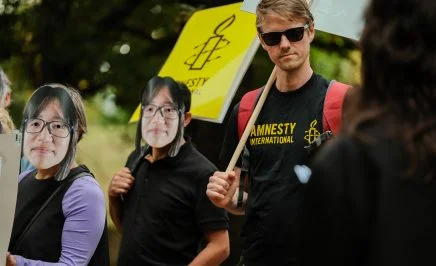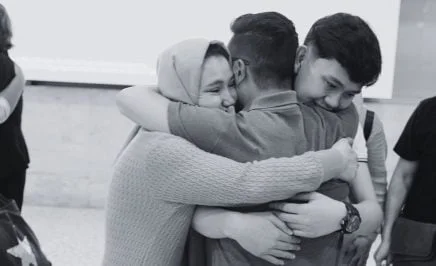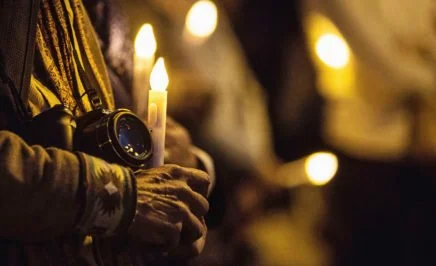The Iranian authorities are preparing to inflict the cruel and irreversible punishment of finger amputation against three prisoners as early as 11 April, following their torture-tainted convictions in unfair trials, Amnesty International warned today.
The organisation is calling on the international community to urgently press the Iranian authorities to end this spectacle of brutality. All Iranian officials responsible for ordering and/or carrying out these acts of torture must be criminally investigated and prosecuted.
Hadi Rostami, Mehdi Sharfian and Mehdi Shahivand, held in Urumieh Central prison, West Azerbaijan province, were informed by prosecution authorities on 13 March 2025 that their amputation sentences would be carried out as early as 11 April 2025. The authorities amputated the fingers of two brothers in the same prison in October 2024 using a guillotine device, raising alarm that they are prepared to carry out further amputation sentences.
“Amputation constitutes torture, which is a crime under international law and is a flagrant and abhorrent assault on human dignity. We call on the Iranian authorities to immediately halt all plans to carry out these cruel and inhuman sentences and abolish all forms of corporal punishment in law and practice,”
Sara Hashash, Deputy Regional Director for the Middle East and North Africa at Amnesty International
“For years, these men have lived in a waking nightmare, knowing the authorities could at any moment mutilate their bodies, committing torture with a judicial seal. The planned amputations, based on ‘confessions’ obtained under torture and following grossly unfair trials, are a chilling reminder of the Iranian authorities’ readiness to inflict irreversible suffering and that Iran’s judicial system is a vital cog in the machinery of torture.
“The prosecution and judicial authorities responsible for ordering and executing such crimes should know they are liable to face criminal prosecution under international law, and states must pursue legal pathways to hold them accountable through universal jurisdiction.”
“We have been unable to sleep or eat, anxiously awaiting the enforcement of our own sentences…This nightmare must end so that we can find a way back to life.”
In a letter from November 2024, Hadi Rostami, Mehdi Sharfian and Mehdi Shahivand described their mental anguish and the “constant nightmare” of awaiting the implementation of their sentence
Following the latest threats in March 2025, Hadi Rostami wrote another letter from inside prison, pleading for help from the international community: “I call upon human rights organizations, the United Nations, and the international community to take urgent action to prevent the implementation of this inhumane sentence.”
Tortured “confessions” and grossly unfair trial
Hadi Rostami (38), Mehdi Sharifian (42), and Mehdi Shahivand (29) have endured years of mental torture, with repeated threats of amputations from the authorities.
All three were arrested in August 2017 and convicted of robbery in 2019 after a grossly unfair trial. According to their court verdict, they are sentenced to “have four fingers on their right hands completely cut off so only the palm of their hands and thumbs are left”.
The men were denied access to lawyers during the investigation phase of their cases and courts relied on forced “confessions” which they have said were obtained under torture to convict them, despite the men retracting them during trial.
According to informed sources, the men were tortured through being beaten, kicked, flogged with a cable and hung from their wrists and feet during interrogations. Hadi Rostami’s hand was broken and interrogators removed Mehdi Shahivand’s trousers and threatened to rape him using a wooden object unless he incriminated himself and the others.
Iranian authorities, including judges at the Supreme Court, failed in their obligations to order investigations into the men’s allegations of torture.
The men have gone on multiple hunger strikes in prison since their conviction to protest inhumane prison conditions and threats to carry out their amputation sentences. Hadi Rostami has also attempted suicide several times.
In February 2021, the authorities further tortured Hadi Rostami by carrying out a flogging sentence of 60 lashes imposed for “disrupting prison order” in reprisal for his hunger strikes.
Pattern of torture through amputation sentences
On 29 October 2024, the authorities in Urumieh Central prison carried out the amputation sentences of two brothers – Mehrdad Teimouri and Shahab Teimouri – from Iran’s Kurdish ethnic minority. After amputating their fingers, they transferred the brothers to a hospital outside prison for medical care but returned them to prison within hours. They then held them for several days in solitary confinement while denying them access to ongoing medical care.
At least two other men – Kasra Karami and Morteza Esmaeilian – held in Urumieh Central prison are also under sentence of finger amputation.
Scores of prisoners across the country are currently feared to be under amputation sentences.
Iran is among the last countries in the world that retains corporal punishments.
The Iranian authorities have issued at least 384 amputation sentences and carried out at least 223 amputation sentences since 1979, according to Abdorrahman Boroumand Center, a human rights organization based outside Iran. The authorities do not publish official figures on amputation sentences issued or implemented, so the real numbers are likely much higher.
Victims of amputations in Iran are overwhelmingly from poor, vulnerable backgrounds. By deliberately maiming them, the Iranian authorities further strip them of means to work and survive, particularly in a society where people with physical disabilities suffer widespread discrimination.
Iranian law mandates a physician’s presence during corporal punishments, violating ethical guidelines and international standards which expressly prohibit health providers’ involvement in torture. Physicians present during the implementation of amputation sentences are complicit in the crime of torture.
Amnesty International is a global movement of more than 10 million people who take injustice personally. We are campaigning for a world where human rights are enjoyed by all – and we can only do it with your support.
Act now or learn more about our human rights campaign.





